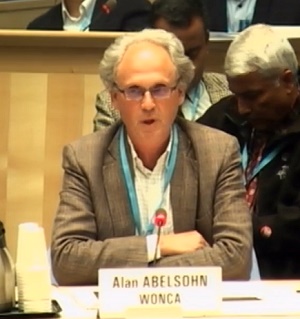WP Environment at WHO Global Conference on Air Pollution and Health.
Alan Abelsohn, past chair of WONCA Working Party on the Environment (WPEnv) reports on the WHO Global Conference on Air Pollution and Health.
Alice McGushin (Vice Chair WPEnv) and I attended the first
WHO Global Conference on Air Pollution and Health, in Geneva, on 30 October-1 November 2018.
It was an intense and inspiring four days: excellent presentations on the science, health and policy perspectives; and lots of networking. Alice was very helpful in pushing our agenda to the WHO organizing committee.
Dr Tedros called air pollution the new tobacco. “The world has turned the corner on tobacco. Now it must do the same for the ‘new tobacco’ – the toxic air that billions breathe every day,” said Dr Tedros Adhanom Ghebreyesus, the WHO’s director general. “No one, rich or poor, can escape air pollution. It is a silent public health emergency.” The combination of both outdoor and household air pollution is responsible for 7.1 million premature deaths annually.
On the final day, High Level Action Day, ministers, mayors, heads of IGOs, NGOs and other multilateral organizations announced their voluntary commitments in the fight against air pollution with health and climate change benefits. On behalf of WONCA, I committed to our train the trainer program. It received significant interest and support, and we will be able to put together a stronger program with collaboration of experts we met; and hopefully roll it out with other partners, from our networking efforts.

My submission follows and can be viewed
here; by clicking on Plenary session X, and going to minute 104.40:
I represent the World Organization of Family Doctors (WONCA). WONCA has 118 Member Organizations in 131 countries and territories, with membership of about 500,000 family doctors, caring for more than 90 per cent of the world’s population.
WONCA has already instituted an educational program: The Air Health Train the Trainer Program. We have to date trained 11 Health Care Professionals.
The program aims to build capacity among family doctors and other health professionals in low and middle income countries.
Importantly, we will also recruit trainers among our students, by working with our colleagues in the International Federation of Medical Students Associations. We also look forward to collaborating with other similar programmes.
Health professionals will be trained remotely through online programs to understand the relationship between ambient and household air pollution and the health of their patients in their communities.
As well as the interactions between air pollution and climate change. They will be trained as advocates, champions or influencers in their medical communities, locally and nationally, as well as in the broader communities and countries where they live.
The idea is to leverage the strong respect and credibility that family doctors and other HCPs enjoy, and the program will be evidence based to protect that credibility.
Participants will be trained to use tools such as an exposure assessment tool and tools describing interventions to reduce both individual level and community level exposure to air pollutants. We look forward to collaborating with WHO to develop these tools.
The program will use a train the trainer approach in which the first trainees will themselves become trainers, multiplying the capacity building, by training their colleagues. This is in accordance with the tradition in medical training: see one, do one, teach one.
WONCAs commitment is that: In the next 12 months, WONCA will recruit and train 40 health professionals in LMICs, for the Air Health Train the Trainer Program, who will then apply the knowledge and tools they have learnt in the program in their own clinics and communities.
We will keep you informed of any develops that unfold; and we await news (hopefully positive) on the funding proposal for the AirHealth Train the Trainer project